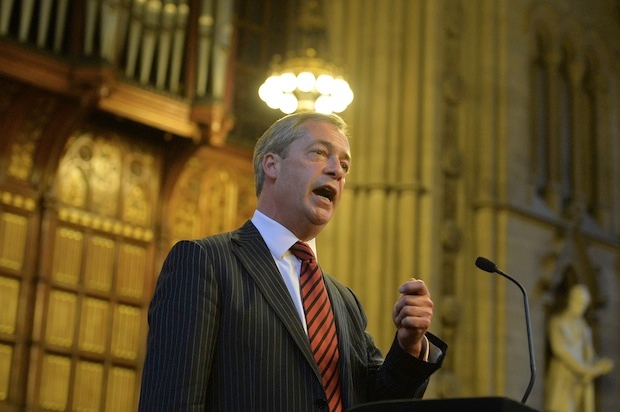One thing that has been abundantly clear about the Tory plan for Ukip is that it will involve a long, slow ‘squeeze message’ (more on that here) that has already been deployed: the vote Ukip, get Miliband line. Naturally, Ukip is keen to counter that and argue that in fact this early squeeze message to encourage voters to think strategically is just wrong. To that end, party donor Alan Bown has taken out a full-page advertisement in the Telegraph today that argues ‘UKIP stand poised for a major breakthrough in 2015, within reach of victory in many seats across the country’. He outlines the results of four polls: in the marginal seats of Crewe & Nantwich and Great Yarmouth, and the safe seats of Folkestone & Hythe and Bognor Regis and Littlehampton.
Bown highlights some of the results that he argues show Ukip isn’t splitting the right-wing vote but becoming the official opposition, and is attracting voters from all parties across the spectrum. He writes:
‘These interesting polls have been interpreted by many as showing that a vote for UKIP was not only a wasted vote, but also a counterproductive one as it could put Miliband into No10, supposedly against the wishes of most UKIP voters. This has become the standard media narrative where Ukip is discussed and a regular Conservative Party attack line.
‘As can be seen from the results, the effect of UKIP has dramatically reshaped the political landscape, but in ways far more complex and interesting than the simplistic narrative of UKIP ‘splitting the Tory vote’ would suggest.’
But the Tories think this poll overstates Ukip’s vote share for a number of reasons: Survation includes Ukip in its list of parties when asking about voting intention while other pollsters such as YouGov prefer to class them under ‘other parties’ as this has returned the most accurate predictions of an election’s outcome in the past; that the polls published by Survation for Bown so far feature a methodological change which favours Ukip by excluding voters who did not give a voting intention from the published poll, rather than reinserting them into the sample based on a factor of which party they voted for in 2010′ and that voting intention is subject to a large margin of error because respondents are excluded for not giving a voting intention. Naturally, they too want to argue that their squeeze message is correct.
But this to-ing and fro-ing over who has the best polling to back up their squeeze message will only be part of the campaign. The other will be an attempt by MPs to highlight inconsistencies in the UKIP offer, and to highlight the party’s ill-preparedness for any form of government. What that campaign will look like for the European elections will become clear in the new year when Lynton Crosby and David Cameron give that promised presentation on their strategy.








Comments